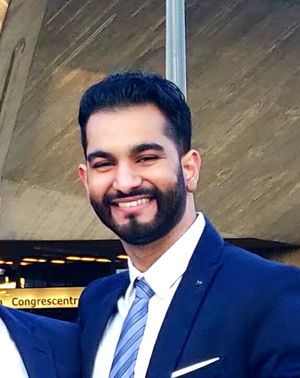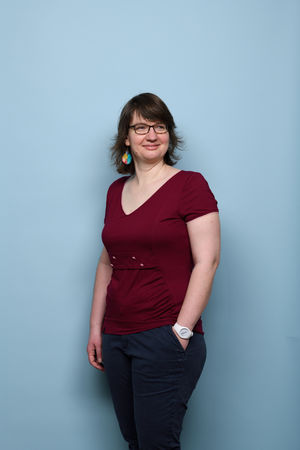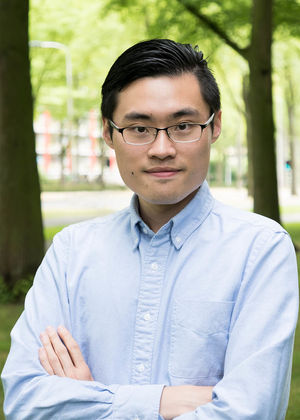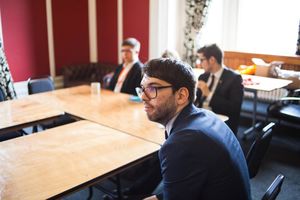“It was the best of times, it was the worst of times.” These are the first words of Charles Dickens’s master novel, A tale of two cities. It details the lives of people in times of great change and uncertainty, how some may thrive while others may experience difficulties. Certainly, the dynamics of the COVID-19 lockdown have changed TU Delft in ways we didn’t think possible. How has the lockdown affected the lives of the humans of EEMCS, their teaching, their research? Let’s have a look.
Dewwret Sitaldin
 Earlier this year, Dewwret Sitaldin won first prize in the national 3E-Royal SMIT Bachelor competition for his work on the photovoltaic system of a solar drone. Unfortunately, the award ceremony was cancelled at the last minute due to COVID-19. ‘It was a team effort, and I would have liked to call my five fellow students onto the stage to share the limelight.’ Much to his regret, the solar drone they designed and for which they had to build a business case as part of their bachelor graduation project, will not evolve into an actual product. But he has plenty of ideas. ‘I have an entrepreneurial spirit and I am currently pursuing another idea, together with a great team. As we are in the very early phase of our start-up, it is all about brainstorming and building a strategy. We meet online and COVID-19 is not slowing us down.’ The lockdown has impacted his life, however, but mostly for the better. ‘I miss the spontaneous exchange of ideas with my fellow students during coffee breaks, bouncing ideas back and forth,’ he says. ‘On the other hand, not having to travel to university has given me plenty of time to think – about life, about business, about how to improve the lives of others.’ Having realized he prefers computational modelling over electronic circuits and soldering, he is currently pursuing a master’s degree in Applied Mathematics, aiming to specialize in machine learning. His organized mind and strict adherence to a schedule allow him to successfully combine both study and start-up, lockdown or not. For charging his batteries, he enjoys biking random routes through his neighbourhood, preferably in the evening hours when the air has cooled down a bit but when there is still sunlight.
Earlier this year, Dewwret Sitaldin won first prize in the national 3E-Royal SMIT Bachelor competition for his work on the photovoltaic system of a solar drone. Unfortunately, the award ceremony was cancelled at the last minute due to COVID-19. ‘It was a team effort, and I would have liked to call my five fellow students onto the stage to share the limelight.’ Much to his regret, the solar drone they designed and for which they had to build a business case as part of their bachelor graduation project, will not evolve into an actual product. But he has plenty of ideas. ‘I have an entrepreneurial spirit and I am currently pursuing another idea, together with a great team. As we are in the very early phase of our start-up, it is all about brainstorming and building a strategy. We meet online and COVID-19 is not slowing us down.’ The lockdown has impacted his life, however, but mostly for the better. ‘I miss the spontaneous exchange of ideas with my fellow students during coffee breaks, bouncing ideas back and forth,’ he says. ‘On the other hand, not having to travel to university has given me plenty of time to think – about life, about business, about how to improve the lives of others.’ Having realized he prefers computational modelling over electronic circuits and soldering, he is currently pursuing a master’s degree in Applied Mathematics, aiming to specialize in machine learning. His organized mind and strict adherence to a schedule allow him to successfully combine both study and start-up, lockdown or not. For charging his batteries, he enjoys biking random routes through his neighbourhood, preferably in the evening hours when the air has cooled down a bit but when there is still sunlight.
Claudia Hauff
 As an associate professor in the Web Information Systems Group, Claudia Hauff is specialized in information retrieval. ‘Everyday search engines are optimized for immediate information needs, such as retrieving tomorrow’s weather,’ she explains. ‘We create algorithms that foster exploration and learning as well as algorithms that allow people to perform collaborative searches, speeding up complex work tasks that cannot be solved quickly by a single person.’ Life and work under the COVID-19 lockdown has been a bit of a challenge for Hauff. ‘One of the satisfactions of working at a university is teaching, but right now it is pretty draining. We had to suddenly switch to and familiarize ourselves with online teaching, just when our daughter’s primary school said: here’s your kid, good luck!’ Hauff attended some conferences and workshops online but being in front of a laptop all day long hasn’t been her most motivating experience ever. Research has to continue as well of course. ‘We participated in a COVID-related challenge on information retrieval and we do our best to submit work, but it is definitely slower going than usual,’ she says. ‘Being at home, it is hard to focus.’ No need to ask her for details, as her daughter and a friend grant us three friendly interruptions during our fifteen-minute skype interview. ‘I’m looking forward to a break. It’s impossible to do good research, good teaching, take care of kids, and not go insane. Luckily, we recently moved to a house with a garden.’ She is more worried about her PhD students, as they are all from abroad and do not have a family to fall back on. ‘I am already satisfied if we all make it out of this alive and healthy.’
As an associate professor in the Web Information Systems Group, Claudia Hauff is specialized in information retrieval. ‘Everyday search engines are optimized for immediate information needs, such as retrieving tomorrow’s weather,’ she explains. ‘We create algorithms that foster exploration and learning as well as algorithms that allow people to perform collaborative searches, speeding up complex work tasks that cannot be solved quickly by a single person.’ Life and work under the COVID-19 lockdown has been a bit of a challenge for Hauff. ‘One of the satisfactions of working at a university is teaching, but right now it is pretty draining. We had to suddenly switch to and familiarize ourselves with online teaching, just when our daughter’s primary school said: here’s your kid, good luck!’ Hauff attended some conferences and workshops online but being in front of a laptop all day long hasn’t been her most motivating experience ever. Research has to continue as well of course. ‘We participated in a COVID-related challenge on information retrieval and we do our best to submit work, but it is definitely slower going than usual,’ she says. ‘Being at home, it is hard to focus.’ No need to ask her for details, as her daughter and a friend grant us three friendly interruptions during our fifteen-minute skype interview. ‘I’m looking forward to a break. It’s impossible to do good research, good teaching, take care of kids, and not go insane. Luckily, we recently moved to a house with a garden.’ She is more worried about her PhD students, as they are all from abroad and do not have a family to fall back on. ‘I am already satisfied if we all make it out of this alive and healthy.’
Tianyi Jin
 As a third year PhD student in the Electronic Components, Technology and Materials Group, Tianyi Jin is well-positioned to help fight COVID-19. ‘The focus of my research is the use of solid-state lighting (LED) for medical applications,’ he says. As soon as the severity of the outbreak in China became clear, his promotor, professor Kouchi Zhang, had the idea to build a scientific instrumentation platform for understanding the disinfecting power of UVC-LED systems. ‘UVC-light is high-energy ultraviolet light, which is needed to penetrate deep into the virus and kill it by destroying its RNA,’ Jin explains. ‘UVC-LED is relatively new technology and we are in the unique position of being able to build industrial prototypes ourselves. Through our close collaboration with Professor Fouchier of the Erasmus MC we have access to the needed knowledge and infrastructure for virologic testing. We want our platform to become a worldwide standard.’ Supported by the TU Delft COVID-19 fund, Jin and his three master students (Shuhan Yang, ShanLiang Deng and Xinyun Xu) are close to having Erasmus MC validate their first prototype. ‘The next step will be to find the optimal lighting recipe, after which we will also consider developing mini-UVC devices ourselves. For disinfecting the surfaces of doorknobs, faucets and elevator buttons, for example.’ The lockdown has affected their research in that they require laboratory access to build their prototypes and hardware, which is difficult without breaking the 1.5-meter distancing rule. ‘On the other hand,’ Jin says, ‘I’m really glad to see that TU Delft and the Dutch government, and organizations worldwide, have made additional COVID-19 related funds available. Funding requests are being handled with lightning speed and scientific journals and conferences have expedited their procedures.’ Maintaining a social life has, however, become much more difficult. ‘Many of my friends and fellow students travelled to China in February to celebrate Chinese New Year with family,’ Jin says, ‘and some of them haven’t been able to return because of the international travel restrictions.’
As a third year PhD student in the Electronic Components, Technology and Materials Group, Tianyi Jin is well-positioned to help fight COVID-19. ‘The focus of my research is the use of solid-state lighting (LED) for medical applications,’ he says. As soon as the severity of the outbreak in China became clear, his promotor, professor Kouchi Zhang, had the idea to build a scientific instrumentation platform for understanding the disinfecting power of UVC-LED systems. ‘UVC-light is high-energy ultraviolet light, which is needed to penetrate deep into the virus and kill it by destroying its RNA,’ Jin explains. ‘UVC-LED is relatively new technology and we are in the unique position of being able to build industrial prototypes ourselves. Through our close collaboration with Professor Fouchier of the Erasmus MC we have access to the needed knowledge and infrastructure for virologic testing. We want our platform to become a worldwide standard.’ Supported by the TU Delft COVID-19 fund, Jin and his three master students (Shuhan Yang, ShanLiang Deng and Xinyun Xu) are close to having Erasmus MC validate their first prototype. ‘The next step will be to find the optimal lighting recipe, after which we will also consider developing mini-UVC devices ourselves. For disinfecting the surfaces of doorknobs, faucets and elevator buttons, for example.’ The lockdown has affected their research in that they require laboratory access to build their prototypes and hardware, which is difficult without breaking the 1.5-meter distancing rule. ‘On the other hand,’ Jin says, ‘I’m really glad to see that TU Delft and the Dutch government, and organizations worldwide, have made additional COVID-19 related funds available. Funding requests are being handled with lightning speed and scientific journals and conferences have expedited their procedures.’ Maintaining a social life has, however, become much more difficult. ‘Many of my friends and fellow students travelled to China in February to celebrate Chinese New Year with family,’ Jin says, ‘and some of them haven’t been able to return because of the international travel restrictions.’
Bence Halpern
 Still using the incomprehensible Skype name he thought of when he was nine years old (karkirowle), you may think that Bence Halpern doesn’t handle change very well. Not so. ‘In general, I have flexible approach to things and even more so during the lockdown,’ he says. ‘I work when I feel productive and shift to the evening or weekend when needed.’ Prior to the COVID-19 lockdown, he used to spend one or two days each week at TU Delft. ‘I am a guest researcher in the Multimedia Computing Group of Odette Scharenborg,’ he explains. ‘The aim of my PhD in speech synthesis at the University of Amsterdam is to predict how a surgical intervention in the treatment of oral cancer will affect the vocal characteristics of a patient. At TU Delft, I can work with some of the best speech processing researchers in the Netherlands.’ Although he is one of those people who does well working from home, COVID-19 has certainly had an impact. ‘My biggest problem is access to medical data, for example those of the Netherlands Cancer Institute,’ he says. ‘I can’t take it home, and I can’t enter the building, so it is all by secure remote connection. It’s quite a hassle.’ He also had to postpone internships in Switzerland and Oxford while a conference in Japan was moved to November. ‘Fortunately, my research doesn’t depend on long-term experimental data taking, so I have the flexibility to move tasks around.’ Being one of the few Dutch PhDs working on speech synthesis, he was asked to join the Can AI Kick It? team participating in the AI Song Contest, organized by the VPRO. ‘We came in third. We finished all preparatory work just prior to the lockdown, but the ceremony in which the winner was announced had to be moved online.’
Still using the incomprehensible Skype name he thought of when he was nine years old (karkirowle), you may think that Bence Halpern doesn’t handle change very well. Not so. ‘In general, I have flexible approach to things and even more so during the lockdown,’ he says. ‘I work when I feel productive and shift to the evening or weekend when needed.’ Prior to the COVID-19 lockdown, he used to spend one or two days each week at TU Delft. ‘I am a guest researcher in the Multimedia Computing Group of Odette Scharenborg,’ he explains. ‘The aim of my PhD in speech synthesis at the University of Amsterdam is to predict how a surgical intervention in the treatment of oral cancer will affect the vocal characteristics of a patient. At TU Delft, I can work with some of the best speech processing researchers in the Netherlands.’ Although he is one of those people who does well working from home, COVID-19 has certainly had an impact. ‘My biggest problem is access to medical data, for example those of the Netherlands Cancer Institute,’ he says. ‘I can’t take it home, and I can’t enter the building, so it is all by secure remote connection. It’s quite a hassle.’ He also had to postpone internships in Switzerland and Oxford while a conference in Japan was moved to November. ‘Fortunately, my research doesn’t depend on long-term experimental data taking, so I have the flexibility to move tasks around.’ Being one of the few Dutch PhDs working on speech synthesis, he was asked to join the Can AI Kick It? team participating in the AI Song Contest, organized by the VPRO. ‘We came in third. We finished all preparatory work just prior to the lockdown, but the ceremony in which the winner was announced had to be moved online.’
